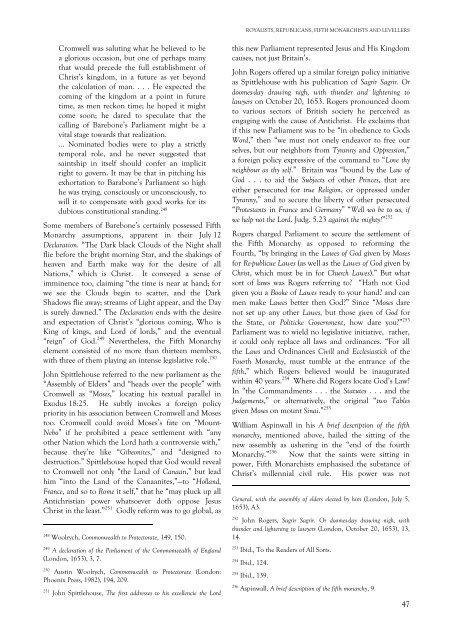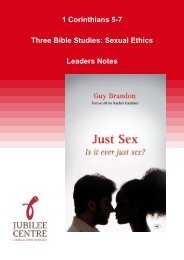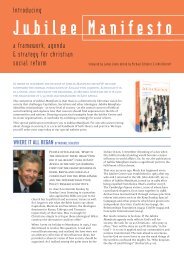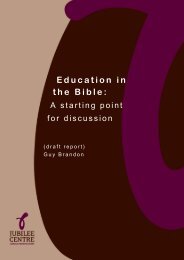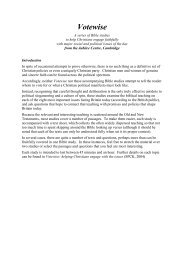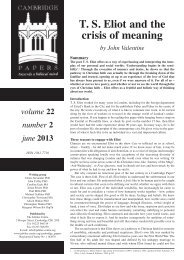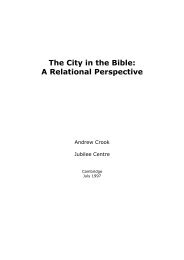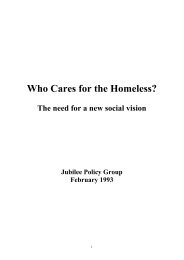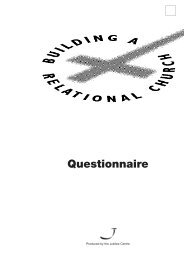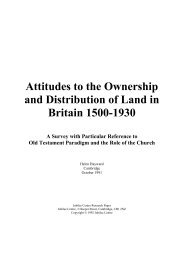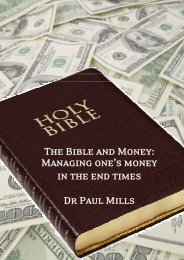Report Template - Jubilee Centre
Report Template - Jubilee Centre
Report Template - Jubilee Centre
Create successful ePaper yourself
Turn your PDF publications into a flip-book with our unique Google optimized e-Paper software.
ROYALISTS, REPUBLICANS, FIFTH MONARCHISTS AND LEVELLERS<br />
Cromwell was saluting what he believed to be<br />
a glorious occasion, but one of perhaps many<br />
that would precede the full establishment of<br />
Christ’s kingdom, in a future as yet beyond<br />
the calculation of man. . . . He expected the<br />
coming of the kingdom at a point in future<br />
time, as men reckon time; he hoped it might<br />
come soon; he dared to speculate that the<br />
calling of Barebone’s Parliament might be a<br />
vital stage towards that realization.<br />
… Nominated bodies were to play a strictly<br />
temporal role, and he never suggested that<br />
saintship in itself should confer an implicit<br />
right to govern. It may be that in pitching his<br />
exhortation to Barabone’s Parliament so high<br />
he was trying, consciously or unconsciously, to<br />
will it to compensate with good works for its<br />
dubious constitutional standing. 248<br />
Some members of Barebone’s certainly possessed Fifth<br />
Monarchy assumptions, apparent in their July 12<br />
Declaration. “The Dark black Clouds of the Night shall<br />
flie before the bright morning Star, and the shakings of<br />
heaven and Earth make way for the desire of all<br />
Nations,” which is Christ. It conveyed a sense of<br />
imminence too, claiming “the time is near at hand; for<br />
we see the Clouds begin to scatter, and the Dark<br />
Shadows flie away; streams of Light appear, and the Day<br />
is surely dawned.” The Declaration ends with the desire<br />
and expectation of Christ’s “glorious coming, Who is<br />
King of kings, and Lord of lords,” and the eventual<br />
“reign” of God. 249 Nevertheless, the Fifth Monarchy<br />
element consisted of no more than thirteen members,<br />
with three of them playing an intense legislative role. 250<br />
John Spittlehouse referred to the new parliament as the<br />
“Assembly of Elders” and “heads over the people” with<br />
Cromwell as “Moses,” locating his textual parallel in<br />
Exodus 18:25. He subtly invokes a foreign policy<br />
priority in his association between Cromwell and Moses<br />
too. Cromwell could avoid Moses’s fate on “Mount-<br />
Nebo” if he prohibited a peace settlement with “any<br />
other Nation which the Lord hath a controversie with,”<br />
because they’re like “Gibeonites,” and “designed to<br />
destruction.” Spittlehouse hoped that God would reveal<br />
to Cromwell not only “the Land of Canaan,” but lead<br />
him “into the Land of the Canaanites,”—to “Holland,<br />
France, and so to Rome it self,” that he “may pluck up all<br />
Antichristian power whatsoever doth oppose Jesus<br />
Christ in the least.” 251 Godly reform was to go global, as<br />
248<br />
Woolrych, Commonwealth to Protectorate, 149, 150.<br />
249<br />
A declaration of the Parliament of the Commonwealth of England<br />
(London, 1653), 3, 7.<br />
250<br />
Austin Woolrych, Commonwealth to Protectorate (London:<br />
Phoenix Press, 1982), 194, 209.<br />
251<br />
John Spittlehouse, The first addresses to his excellencie the Lord<br />
this new Parliament represented Jesus and His Kingdom<br />
causes, not just Britain’s.<br />
John Rogers offered up a similar foreign policy initiative<br />
as Spittlehouse with his publication of Sagrir Sagrir. Or<br />
doomes-day drawing nigh, with thunder and lightening to<br />
lawyers on October 20, 1653. Rogers pronounced doom<br />
to various sectors of British society he perceived as<br />
engaging with the cause of Antichrist. He exclaims that<br />
if this new Parliament was to be “in obedience to Gods<br />
Word,” then “we must not onely endeavor to free our<br />
selves, but our neighbors from Tyranny and Oppression,”<br />
a foreign policy expressive of the command to “Love thy<br />
neighbour as thy self.” Britain was “bound by the Law of<br />
God . . . to aid the Subjects of other Princes, that are<br />
either persecuted for true Religion, or oppressed under<br />
Tyranny,” and to secure the liberty of other persecuted<br />
“Protestants in France and Germany” “Well wo be to us, if<br />
we help not the Lord. Judg. 5.23 against the mighty!” 252<br />
Rogers charged Parliament to secure the settlement of<br />
the Fifth Monarchy as opposed to reforming the<br />
Fourth, “by bringing in the Lawes of God given by Moses<br />
for Re-publicue Lawes (as well as the Lawes of God given by<br />
Christ, which must be in for Church Lawes).” But what<br />
sort of laws was Rogers referring to? “Hath not God<br />
given you a Booke of Lawes ready to your hand? and can<br />
men make Lawes better then God?” Since “Moses dare<br />
not set up any other Lawes, but those given of God for<br />
the State, or Politicke Government, how dare you?” 253<br />
Parliament was to wield no legislative initiative, rather,<br />
it could only replace all laws and ordinances. “For all<br />
the Laws and Ordinances Civill and Ecclesiastick of the<br />
Fourth Monarchy, must tumble at the entrance of the<br />
fifth,” which Rogers believed would be inaugurated<br />
within 40 years. 254 Where did Rogers locate God’s Law?<br />
In “the Commandments . . . the Statutes . . . and the<br />
Judgements,” or alternatively, the original “two Tables<br />
given Moses on mount Sinai.” 255<br />
William Aspinwall in his A brief description of the fifth<br />
monarchy, mentioned above, hailed the sitting of the<br />
new assembly as ushering in the “end of the fourth<br />
Monarchy.” 256 Now that the saints were sitting in<br />
power, Fifth Monarchists emphasised the substance of<br />
Christ’s millennial civil rule. His power was not<br />
General, with the assembly of elders elected by him (London, July 5,<br />
1653), A3.<br />
252<br />
John Rogers, Sagrir Sagrir. Or doomes-day drawing nigh, with<br />
thunder and lightening to lawyers (London, October 20, 1653), 13,<br />
14.<br />
253<br />
Ibid., To the Readers of All Sorts.<br />
254<br />
Ibid., 124.<br />
255<br />
Ibid., 139.<br />
256<br />
Aspinwall, A brief description of the fifth monarchy, 9.<br />
47


